Advanced Spanish Step-by-Step: Master Accelerated Grammar to Take Your Spanish to the Next Level (2012)
Part II. Nouns, Articles, Adjectives, Pronouns; Present and Past Perfect Tenses
Chapter 8. The Present Perfect Tense
The present perfect tense expresses past action closely related to the present.
The present perfect is a compound tense formed with the present tense of the helping verb haber and the past participle of the main verb. The English equivalent of haber + past participle is to have done something. In the present tense, it corresponds to the present perfect in English: I have eaten there many times, for example.
The present perfect tense expresses the following:
• An action that we are waiting for, but that hasn’t yet happened
• An action that began in the past and continues to the present
• An action that has happened at various times in the past and may happen again
Formation of the Past Participle
-Ar Verbs
To form the past participle of all -ar verbs, drop the ending and add -ado to the stem.

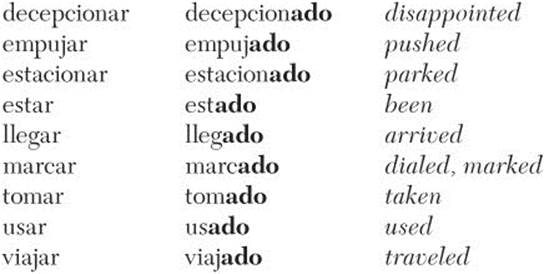
-Er and -ir Verbs
To form the past participle of most -er and -ir verbs, drop the ending and add -ido to the stem.
-Er Verbs

-Ir Verbs
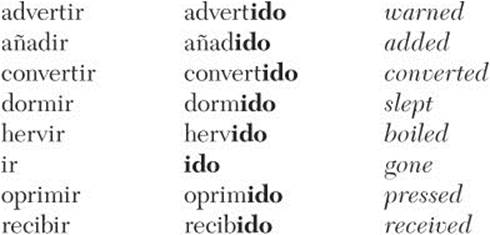
![]() Pronunciation Reminder
Pronunciation Reminder
In all regular past participles, the Spanish d is pronounced like the soft th sound in English other. Practice the pronunciation of past participles with a th sound.
-Er and -ir verbs whose stem ends in a vowel have a written accent above the -i- in the past participle to maintain the -ido sound.
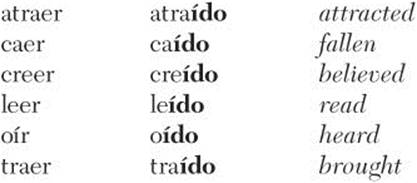
Verbs that end in -uir do not carry a written accent in the past participle.

Irregular Past Participles
Following are the 12 basic irregular past participles in Spanish. Pronounce each of them as you learn them.
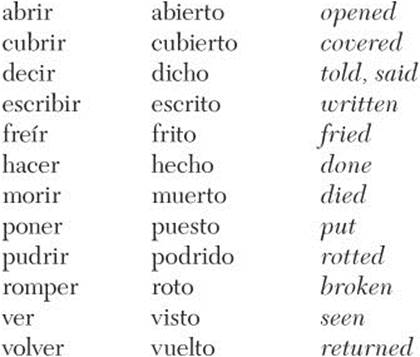
When a prefix is added to any of the irregular verbs above, the past participle shows the same irregularity.
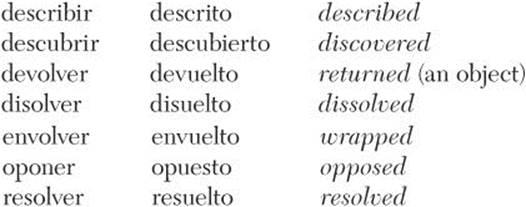
![]() Exercise 8.1
Exercise 8.1
Write the past participle of the following verbs. Pronounce each past participle aloud, and make sure you know the meaning of the verb.
1. jugar_________________________
2. buscar_________________________
3. conocer_________________________
4. entrar_________________________
5. devolver_________________________
6. ser_________________________
7. estar_________________________
8. dar_________________________
9. ver_________________________
10. escribir_________________________
11. romper_________________________
12. tener_________________________
13. querer_________________________
14. hacer_________________________
15. decir_________________________
16. ir_________________________
17. abrir_________________________
18. cerrar_________________________
19. morir_________________________
20. amar_________________________
Formation of the Present Perfect Tense
To form the present perfect tense in Spanish, conjugate the helping verb haber (the English auxiliary verb to have) in the present tense and follow it with the past participle of the main verb.
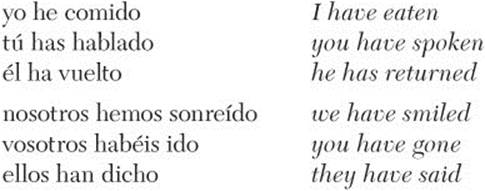
NOTE The verb haber is used as an auxiliary or helping verb to form the perfect tenses. The verb tener means to have in the sense of possession: yo tengo dos libros. Tener is never used as an auxiliary verb.
The helping verb haber cannot be separated from the past participle. In a question, place the subject after the verb form.
![]()
![]() Exercise 8.2
Exercise 8.2
Complete the following phrases with the correct past participle of the verb in parentheses. Practice pronouncing each phrase aloud.
1. yo he_________________________(ser)
2. tú has_________________________(tener)
3. ella ha_________________________(poder)
4. nosotros hemos_________________________(estar)
5. vosotros habéis_________________________(querer)
6. ellas han_________________________(saber)
7. yo he_________________________(decir)
8. tú has_________________________(dar)
9. Ud. ha_________________________(volver)
10. nosotros hemos_________________________(poner)
11. vosotros habéis_________________________(hacer)
12. Uds. han_________________________(llegar)
Complete the following phrases with the correct form of the present perfect tense of the verb in parentheses.
13. yo_________________________(dormir)
14. tú_________________________(romper)
15. ella_________________________(abrir)
16. nosotros_________________________(estar)
17. vosotros_________________________(escribir)
18. ellas_________________________(ver)
Uses of the Present Perfect Tense
The present perfect tense expresses an action closely related to the present. Its English equivalent corresponds to the present perfect tense in English.
The present perfect tense expresses the following:
• An action that we are waiting for, but that hasn’t yet happened
• An action that began in the past and continues to the present
• An action that has happened at various times in the past and may happen again
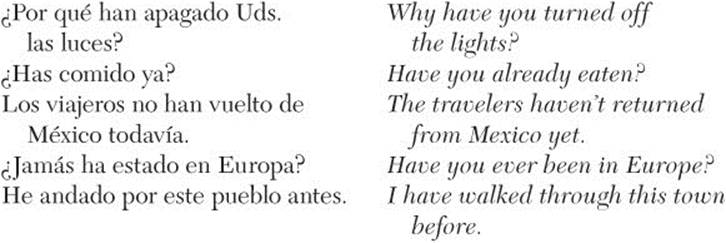
NOTE The words jamás (meaning ever in an affirmative sentence or question), ya (meaning already), and todavía (meaning still or yet) frequently occur in sentences using the present perfect tense.
Action Waited for or Hoped for

Compare the following sentences. The first sentence of each pair is in the preterit and the second is in the present perfect.

Action That Began in the Past and Continues to the Present

Action That Happened in the Past and May Happen Again
Often the actions expressed can be counted.
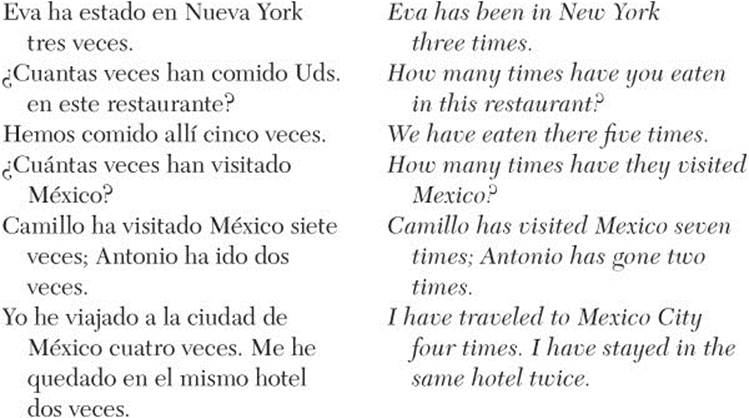
Placement of Object Pronouns with the Present Perfect Tense
The reflexive, indirect, and direct object pronouns are placed directly before the helping verb. This is the only possible position for object pronouns used with the present perfect tense. The object pronouns are never attached to the past participle.
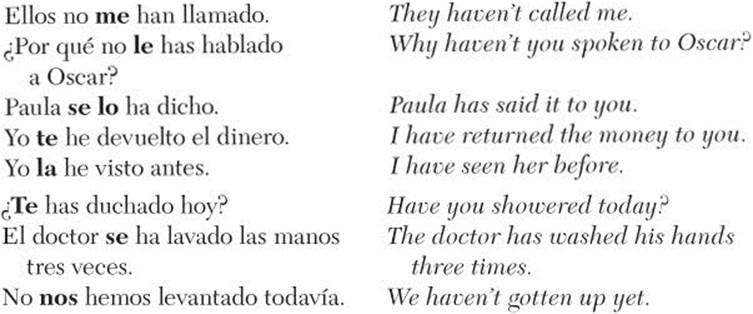
![]() Exercise 8.3
Exercise 8.3
Complete the following sentences with the correct form of the present perfect tense of the verb in parentheses.
1. Laura nos_________________________la carta. (traer)
2. Nosotros todavía no la_________________________. (recibir)
3. Los hoteleros no me_________________________. (llamar)
4. Sus hermanos nunca le_________________________dinero. (prestar)
5. ¿Por qué jamás me_________________________tú? (amar)
6. Por fin, mis amigos_________________________. (volver)
7. El bisabuelo que tenía cien años_________________________. (morirse)
8. ¿Adónde_________________________ellos? (irse)
9. Uds._________________________bien el trabajo. (hacer)
10. Tus colegas siempre_________________________bien de ti.(hablar)
11. Irene y su hermano jamás_________________________. (viajar)
12. Yo la_________________________recientemente. (ver)
13. Yo no_________________________ dormir. (poder)
14. Ellas ya_________________________. (acostarse)
15. Nosotros_________________________a otra casa. (mudarse)
Use of the Infinitive haber and the Past Participle
The infinitive form of the helping verb haber is used after a preposition.
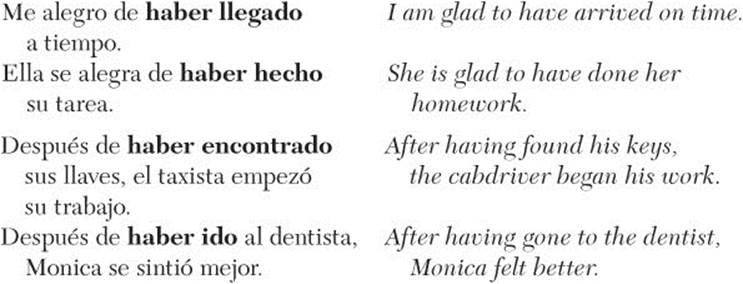
Because object pronouns can never be attached to the past participle, when they are needed in an infinitive + past participle construction, they must be attached to the infinitive, in this case, haber.

![]() Exercise 8.4
Exercise 8.4
Complete the following sentences with the correct form of haber.
1. Después de_________________________leído el párrafo, los estudiantes están contentos.
2. Nosotros_________________________corrido a casa.
3. Sus padres les_________________________dado una bienvenida.
4. Después de_________________________comido galletas y leche, los niños están listos para acostarse.
5. Nosotros ya_________________________leído el libro.
6. El muchacho_________________________entendido la lección.
7. Sus profesores les_________________________enseñado bien.
8. Después de_________________________aprobado el examen, ellos se sienten satisfechos.
9. ¿_________________________hecho bien los niños?
10. Los alumnos_________________________empezado a aprender mucho.
![]() Exercise 8.5
Exercise 8.5
Rewrite the following sentences in the present perfect tense. You may include additional words or expressions in the sentence if you wish.
EXAMPLE Julia no toma mucha cerveza.
Julia no ha tomado mucha cerveza (todavía).
1. Cruzo la calle a la escuela.
__________________________________________________
2. Jamás entro en la clase.
__________________________________________________
3. Mis compañeros entran también.
__________________________________________________
4. Le decimos “hola” al profesor.
__________________________________________________
5. Nos sentamos.
__________________________________________________
6. Escribo con lápiz.
__________________________________________________
7. Mis amigos usan una computadora.
__________________________________________________
8. Contestamos las preguntas.
__________________________________________________
9. Almorzamos juntos.
__________________________________________________
10. Nos despedimos del profesor.
__________________________________________________
11. Vamos en bus a casa.
__________________________________________________
12. Les saludamos a nuestros padres al llegar a casa.
__________________________________________________
![]() Exercise 8.6
Exercise 8.6
Translate the following sentences into Spanish.
1. How have you been?
__________________________________________________
2. Where have all the flowers gone?
__________________________________________________
3. Who has just called?
__________________________________________________
4. What have you done?
__________________________________________________
5. We have sent the document.
__________________________________________________
6. Have they had breakfast today?
__________________________________________________
7. I have turned on the oven and have put in the chicken. I have to cook it for an hour.
__________________________________________________
__________________________________________________
8. It is no longer hot, because the students have opened all the windows in the classroom.
__________________________________________________
__________________________________________________
9. The exterminators have killed all the cockroaches.
__________________________________________________
10. Laura and her daughter have just arrived in Italy.
__________________________________________________
![]() A Word About acabar de
A Word About acabar de
Remember: When you want to say to have just done something, use the expression acabar de in the present tense, not the verb haber with the present perfect tense.

![]() Reading Comprehension
Reading Comprehension
El apartamento
¿Desde cuándo viven los inquilinos en este edificio en la calle cuarenta y seis con la novena avenida? ¿Quién sabe? La gente no se mete en la vida de nadie. Pero yo sí sé porque me gusta observar la ida y vuelta de la muchedumbre. Es verdad que hay muchos inquilinos que ya se han ido o les han alquilado su apartamento a otros. Los apartamentos son pequeños, pero agradables, y bastante baratos en comparación a otros lugares en la ciudad. Por mi parte, sigo firmando el contrato de arrendamiento año de por medio con muchísimas ganas de quedarme. Los porteros son agradables y el superintendente, que vive solo en el primer piso, nos trata bien.
Una pareja del octavo piso ha tenido un bebé hace ocho meses y están viviendo felices. En el décimo piso, dos personas, una mujer que está vieja ya, aunque tiene solamente cuarenta y cinco años, y su compañero (nunca se han casado) se pelean, gritan, y comen mucha comida rápida de restaurantes. (Veo a los mensajeros con pizza o con comida china todo el tiempo). Una mujer muy simpática del tercer piso se ha muerto, y otra mujer del cuarto piso, pelirroja, cuyo perro se ha desaparecido, vive desesperada y triste. En el piso once, un hombre amargado sin amigos sube y baja en el ascensor todos los días. Cuando voy vagando por el edificio, escucho a veces sonidos de amor por la noche en el sexto y el séptimo. En el quinto piso vive un hombre a quien le gusta patinar. Hace muchos años, él tenía una novia bonita e inteligente. Se separaron de repente, y este hombre, tan fuerte y guapo en días pasados, nunca ha tenido otra compañera. Un día voy a escribir un libro, pero por ahora, estoy satisfecha, mirando a la gente, escuchándola ir y venir en la vida cotidiana.
Verbos

Nombres

Adjetivos

Expresión
![]()
Preguntas
1. ¿Se conoce la gente en este edificio?
__________________________________________________
2. ¿Cuántos pisos hay?
__________________________________________________
3. ¿Cuántas personas están felices en el edificio?
__________________________________________________
4. ¿Cómo sabe tanto de la gente la protagonista?
__________________________________________________